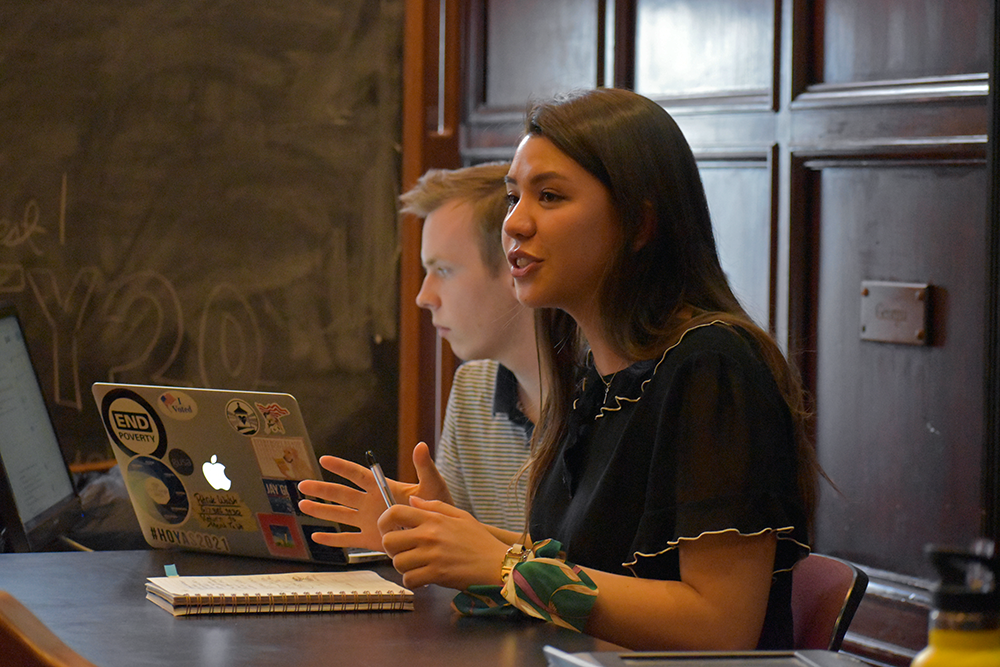The full Georgetown University Student Association senate voted unanimously to approve the 2019-20 fiscal year student activities budget March 24, after passing an amendment to change the budget previously approved by the finance and appropriations committee.
The amendment, proposed by FinApp Chair Hayley Grande (COL ’21), reallocated funds from the Student Activities Commission, the Media Board, Georgetown Program Board and Outdoor Education to GUSA.
The FinApp committee, which is made up of 12 GUSA senators, first released its draft budget Feb. 26, allocating $1,092,000 to six advisory boards, GPB, the Georgetown University Lecture Fund, the GUSA executive and other applicants. Though the overall budget increased 2.4 percent from last year, student group funding requests totaled $1,321,040.80, resulting in cuts to individual budgets.

Budget deliberations began Feb. 26 at the FinApp summit, where applicants for funding gave presentations explaining their budget requests. Public appeals sessions in which the student groups appealed against the draft budget were held March 13 and 17. The FinApp committee approved the budget at the end of the appeals session March 17.
Of the 13 student groups and boards FinApp funded for the 2019-20 academic year, six appealed their allotments. The six groups that appealed were the Center for Social Justice Advisory Board for Student Organizations, the Student Activities Commission, GPB, the Advisory Board for Club Sports, the Performing Arts Advisory Council and Outdoor Education.
The Lecture Fund received $85,000 of its $98,000 request, matching its allocated funding from last year.
The Advisory Board for Club Sports received an allocation of $225,000, a decrease of 27.36 percent from its initial request. This allocation is $10,000 less than the board’s budget from last year.
The FinApp committee allocated $304,300 to the Student Activities Commission, a 6.4 percent cut from its request but $32,000 more than its budget last year. As the advisory board for the majority of clubs on campus, SAC distributes funds to over 110 student organizations.
The committee also approved $140,942.61 for GPB in its budget, 5.09 percent less than the club’s requested budget of $148,500 and $5,000 more than its allocation last year.
GUSA allocated Georgetown Opportunities for Leadership Development $4,500, 56 percent of the group’s initial request. This marks an increase of $500 from fiscal year 2017-18, the last time GOLD applied for funding. GOLD was funded as a Part B applicant, an option open to any student groups not supported by an advisory board who can apply for funding but are not guaranteed consideration by FinApp.
The other two Part B applicants who received funding were Outdoor Education, who received 53 percent of their requested funding, and the Transfer Council, who received 94 percent.
The budget requested by GUSA executives Norman Francis Jr. (COL ’20) and Aleida Olvera (COL ’20) for GUSA as a whole faced the largest cuts, with the pair receiving only 11 percent of their requested funds. The executives initially requested a budget of $26,760, which was cut to $1,735 in the budget approved by the FinApp committee March 17. Last year, FinApp granted GUSA $13,955.
At the senate meeting Sunday, GUSA senator Grande proposed an amendment allocating an additional $1,222.39 toward GUSA expenses. Grande proposed the bill in her capacity as a senator, and not as FinApp Chair. The amendment moved $200 from the Student Activities Commission, $200 from the Media Board, $322.39 from GPB and $500 from Outdoor Education to provide GUSA with a final budget of $2,957.39.
While most of the cuts to GUSA’s original request were manageable, more money was needed to cover necessary expenses, according to Grande. These expenses include a fee for the group’s partnership with the group TurboVote, charges for the GUSA and SaxaFund SquareSpace website, and money toward funding for an ongoing GUSA initiative, which began during the term of former executives Kamar Mack (COL ’19) and Jessica Andino (COL ’18), to replace broken ropes on the existing hammocks on campus.
Grande said the additional allocation to GUSA this year comes from unexpected fees left behind by previous GUSA executives.
“In short, it seems that previous administrations have gotten tied into certain contracts, complications that were not put into the record, were not very explicit, and were not known by the committee until this morning,” Grande said. “I have a lot of problems with this, but it’s kind of the current state of things.”
The amendment changed a decision made during appeals last week to increase funding of Outdoor Education to properly train guides and subsidize trips for students. No representatives from Outdoor Education were present at the Sunday meeting.
Senator Dylan Hughes (COL ’19), a member of FinApp and liaison to the transfer council, proposed an amendment to Grande’s amendment, requesting that the $500 taken from the Outdoor Education budget instead be taken from the performing arts council. Hughes’ amendment failed on voice vote.
The senate then gave unanimous approval of Grande’s amendment and voted unanimously to approve the budget as a whole. The budget awaits final approval from Francis, who plans to sign the budget, according to Winston Ardoin (SFS ’21), chief communications director for the GUSA executive.
The GUSA executives hope to expand the FinApp funding procedure to include greater student input in the future, according to Ardoin.
“Norman and Aleida believe that the process could be improved to promote student voices,” Ardoin wrote in an email to The Hoya. “Though Norman and Aleida still do not know exactly how they wish to implement this change, they do wish that students who worked more directly within the funding boards or within the clubs themselves had more of an input.”
This article was updated March 28 to reflect that Hughes’ amendment failed on voice vote and that GOLD has been funded in the past.




















